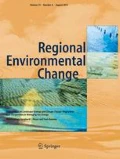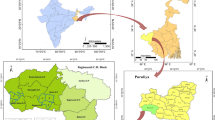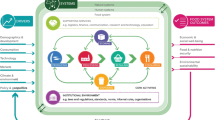Abstract
Smallholder farmers with limited governmental and institutional support often devise innovative strategies to mitigate the impacts of water stress on agricultural production. These drought mitigation strategies can be more culturally and ecologically suitable than top-down, “technocratic,” strategies. Top-down drought mitigation approaches, however, often link farmers with significant infrastructures, financial resources, and specialized knowledge. Successful rescaling of localized mitigation practices can integrate the benefits of localized mitigation with resources available at larger scales. This paper describes the rescaling of a Sri Lankan drought mitigation practice known as bethma. We focus on the process of rescaling, specifically what is lost and gained when this local practice is implemented at a much larger scale. We identify factors driving participation in bethma and the impacts of this participation on farmer livelihoods. Results suggest that participation in bethma during water-scarce seasons has significant positive impacts on agricultural yields, but that this participation is strongly influenced by the nature of a farmer’s land ownership. Much of the success of bethma’s implementation is due to the decentralized, flexible implementation at a regional scale. The loss of localized information, however, influences farmer participation in the practices and the distribution of the benefits associated with bethma.


Similar content being viewed by others
Notes
The Sri Lankan government lists over 11,250 locally managed systems (Imbulana, Wijesekera, and Neupane 2006).
Large-scale irrigation systems with command areas greater than 400 ha.
Bethma often takes place across multiple communities that are home to diverse ethnic groups. Our survey data only captures intra-community dynamics.
It should be noted that many agrowells are recharged by seasonal surface water flows, so in extremely water scarce seasons, many of these wells go dry (Kikuchi, Barker, Weligamage, and Samad 2002; Villholth and Rajasooriyar 2009).
We report beta coefficients divided by four to make results more easily interpretable. This new value is indicative of the difference in probability of participation in bethma associated with a one unit change of the corresponding covariate (Gelman and Hill 2007).
References
Abeyratne S, Perera J (1986) Change and continuity in village irrigation system: a case study in the Moneragala district, Sri Lanka. Retrieved from http://harti.nsf.ac.lk/handle/1/2267.
Adger WN, Arnell NW, Tompkins EL (2005) Successful adaptation to climate change across scales. Glob Environ Chang 15(2):77–86. https://doi.org/10.1016/j.gloenvcha.2004.12.005
Adger WN, Barnett J, Brown K, Marshall N, O’Brien K (2013) Cultural dimensions of climate change impacts and adaptation. Nat Clim Chang 3(2):112–117. https://doi.org/10.1038/nclimate1666
Agrawal A, Perrin N (2009) Climate adaptation, local institutions and rural livelihoods. In: Adger WN, I L, O’Brien K (eds) Adapting to climate change: thresholds, values, governance. School of Natural Resources and Environment, University of Michigan. International Forestry Resources and Institutions Program, IFRI. Working Paper, W081-6, pp 350–67
Azmi F (2007) Changing livelihoods among the second and third generations of settlers in system H of the accelerated Mahaweli Development Project (AMDP) in Sri Lanka. Norwegian Geography Journal 61(1):1–12. https://doi.org/10.1080/00291950601173903
Bebermeier W, Meister J, Withanachchi CR, Middelhaufe I, Schütt B (2017) Tank cascade systems as a sustainable measure of watershed management in South Asia. Water 9(3):231. https://doi.org/10.3390/w9030231
Berkes F, Jolly D (2002) Adapting to climate change: social-ecological resilience in a Canadian western arctic community. Ecol Soc 5(2):8
Burchfield EK, Gilligan J (2016a) Agricultural adaptation to drought in the Sri Lankan dry zone. Appl Geogr 77:92–100. https://doi.org/10.1016/j.apgeog.2016.10.003
Burchfield EK, Gilligan JM (2016b) Dynamics of individual and collective agricultural adaptation to water scarcity. In Winter Simulation Conference (WSC), pp 1678–1689. IEEE Retrieved from http://ieeexplore.ieee.org/abstract/document/7822216/
Burchfield EK, Tozier de la Poterie A (2018) Determinants of crop diversification in rice-dominated Sri Lankan agricultural systems. J Rural Stud. https://doi.org/10.1016/j.jrurstud.2018.05.010
Cash D, Adger WN, Berkes F, Garden P, Lebel L, Olsson P, Pritchard L, & Young O. (2006). Scale and cross-scale dynamics: governance and information in a multilevel world. Ecology and society, 11(2).
Chambers R (1988) Managing canal irrigation: practical analysis from South Asia. Cambridge University Press, Cambridge
Chandrasiri JKMD, Baminiarachchi BADS (2015) Reasons for low adoption of selected OFC and vegetable varieties released by the Department of Agriculture (No. 182). Reasons for low adoption of selected OFC and vegetable varieties released by the Department of Agriculture. Retrieved from http://www.harti.gov.lk/images/download/reasearch_report/2016/182.pdf
De Silva CS, Weatherhead EK, Knox JW, Rodriguez-Diaz JA (2007) Predicting the impacts of climate change—a case study of paddy irrigation water requirements in Sri Lanka. Agric Water Manag 93(1–2):19–29. https://doi.org/10.1016/j.agwat.2007.06.003
Eakin H, Tucker CM, Castellanos E, Diaz-Porras R, Barrera JF, Morales H (2013) Adaptation in a multi-stressor environment: perceptions and responses to climatic and economic risks by coffee growers in Mesoamerica. Environ Dev Sustain 16(1):123–139. https://doi.org/10.1007/s10668-013-9466-9
Gandure S, Walker S, Botha JJ (2013) Farmers’ perceptions of adaptation to climate change and water stress in a South African rural community. Environmental Development 5:39–53. https://doi.org/10.1016/j.envdev.2012.11.004
Gelman A (2008) Scaling regression inputs by dividing by two standard deviations. Stat Med 27:2865–2873
Gelman A, Hill J (2007) Data analysis using regression and multilevel/hierarchical models. Cambridge University Press
Gelman A, Jakulin A, Grazia M, Su P, Su Y (2008) A weakly informative default prior distribution for logistic and other regression models. Ann Appl Stat 2(4):1360–1383
Gibson CC, Ostrom E, Ahn T-K (2000) The concept of scale and the human dimensions of global change: a survey. Ecol Econ 32(2):217–239
Imbulana KAUS, Wijesekera NTS, Neupane BR (2006) Sri Lanka National Water Development Report. Government of Sri Lanka
Jabeen H, Johnson C, Allen A (2010) Built-in resilience: learning from grassroots coping strategies for climate variability. Environ Urban 22(2):415–431. https://doi.org/10.1177/0956247810379937
Jinapala K, De Silva S, Aheeyar MMM, Needs D, Management W (2010) Volume 3: Policies, Institutions and Data Needs for Water Management. In National Conference on Water, Food Security and Climate Change in Sri Lanka (Vol. 3). Colombo, Sri Lanka: International Water Management Institute
Mahaweli Authority of Sri Lanka (2011) Statistical Handbook. Retrieved from http://mahaweli.gov.lk/en/statistics.html#
Manthrithilake H, Liyanagama B (2012) Simulation model for participatory decision making: water allocation policy implementation in Sri Lanka. Water International, pp 37–41
Moore M (1989a) The fruits and fallacies of neoliberalism: the case of irrigation policy. World Dev 17(11):1733–1750
Moore M (1989b) The ideological history of the Sri Lankan ‘peasantry’. Modern Asian Studies 23(1):179–207. https://doi.org/10.1017/S0026749X00011458
Moss T, Newig J (2010) Multilevel water governance and problems of scale: setting the stage for a broader debate. Environ Manag 46(1):1–6. https://doi.org/10.1007/s00267-010-9531-1
Nakashima DJ, McLeanKG, Thulstrup HD, Castillo AR, Rubis JT (2012) Weathering uncertainty: traditional knowledge for climate change assessment and adaptation. Paris and Darwin: UNESCO and UNU
Nyong A, Adesina F, Osman Elasha B (2007) The value of indigenous knowledge in climate change mitigation and adaptation strategies in the African Sahel. Mitig Adapt Strateg Glob Chang 12(5):787–797. https://doi.org/10.1007/s11027-007-9099-0
Panabokke CR, Sakthivadivel R, Weerasinghe AD (2002) Small tanks in Sri Lanka: evolution, present status, and issues. International Water Management Institute, Colombo
Petheram L, Zander KK, Campbell BM, High C, Stacey N (2010) ‘Strange changes’: indigenous perspectives of climate change and adaptation in NE Arnhem Land (Australia). Glob Environ Chang 20(4):681–692. https://doi.org/10.1016/j.gloenvcha.2010.05.002
Risbey J, Kandlikar M, Dowlatabadi H, Graetz D (1999) Scale, context, and decision making in agricultural adaptation to climate variability and change. Mitig Adapt Strateg Glob Chang 4(2):137–165. https://doi.org/10.1023/A:1009636607038
Stringer LC, Dyer JC, Reed MS, Dougill AJ, Twyman C, Mkwambisi D (2009) Adaptations to climate change, drought and desertification: local insights to enhance policy in southern Africa. Environ Sci Pol 12(7):748–765. https://doi.org/10.1016/j.envsci.2009.04.002
Termeer CJ, Dewulf A, van Lieshout M (2010) Disentangling scale approaches in governance research: comparing monocentric, multilevel, and adaptive governance. Retrieved from http://repository.ubn.ru.nl/handle/2066/151894
Thiruchelvam S (2010) Agricultural production efficiency of Bethma cultivation in Mahaweli System H. Sri Lankan Journal of Agricultural Economics, 7. Retrieved from http://sjae.sljol.info/articles/10.4038/sjae.v7i0.1820/
Valdivia C, Seth A, Gilles JL, García M, Jiménez E, Cusicanqui J, Navia F, Yucra E (2010) Adapting to climate change in Andean ecosystems: landscapes, capitals, and perceptions shaping rural livelihood strategies and linking knowledge systems. Ann Assoc Am Geogr 100(4):818–834. https://doi.org/10.1080/00045608.2010.500198
Villholth KG, Rajasooriyar LD (2009) Groundwater resources and management challenges in Sri Lanka—an overview. Water Resour Manag 24(8):1489–1513. https://doi.org/10.1007/s11269-009-9510-6
Vyas S, Kumaranayake L (2006) Constructing socio-economic status indices: how to use principal components analysis. Health Policy Plan 21(6):459–468. https://doi.org/10.1093/heapol/czl029
Wilhite DA, Vanyarkho OV (2000) Drought: pervasive impacts of a creeping phenomenon. Retrieved from http://digitalcommons.unl.edu/droughtfacpub/71/
Wilhite DA, Svoboda MD, Hayes MJ (2007) Understanding the complex impacts of drought: a key to enhancing drought mitigation and preparedness. Water Resour Manag 21(5):763–774. https://doi.org/10.1007/s11269-006-9076-5
Wolf AT (2007). Shared waters: Conflict and cooperation. Annu. Rev. Environ. Resour., 32, 241-269.
World Food Programme (2014) Drought: food security and livelihoods affected by erratic weather. Retrieved from https://www.wfp.org/sites/default/files/L-Joint%20Assessment%20of%20Drought%20Impact%20on%20Food%20Security%20and%20Livelihoods_fi....pdf
Zubair L (2005) Modernisation of Sri Lanka’s traditional irrigation systems and sustainability. Science, Technology, and Society 10(2):161–195. https://doi.org/10.1177/097172180501000201
Acknowledgements
We thank the anonymous reviewers for helpful suggestions that improved the paper. We would also like to thank our research assistants, Dilini Abeysekara, Ramesh Ranaweera, and Brindharshini Thiyagaraja, as well as Malaka Dhamruwan for his help in coordinating the research. Thank you to Josh Bazuin for constructive feedback.
Funding
The US National Science Foundation Water, Sustainability, and Climate grant EAR-1204685 funded this research. Dr. Burchfield thanks the American Institute for Sri Lankan studies for a Dissertation Travel Grant which funded travel to collect qualitative data.
Author information
Authors and Affiliations
Corresponding author
Additional information
Editor:Erica Smithwick.
Rights and permissions
About this article
Cite this article
Burchfield, E., Williams, N.E. & Carrico, A.R. Rescaling drought mitigation in rural Sri Lanka. Reg Environ Change 18, 2495–2503 (2018). https://doi.org/10.1007/s10113-018-1374-y
Received:
Accepted:
Published:
Issue Date:
DOI: https://doi.org/10.1007/s10113-018-1374-y




